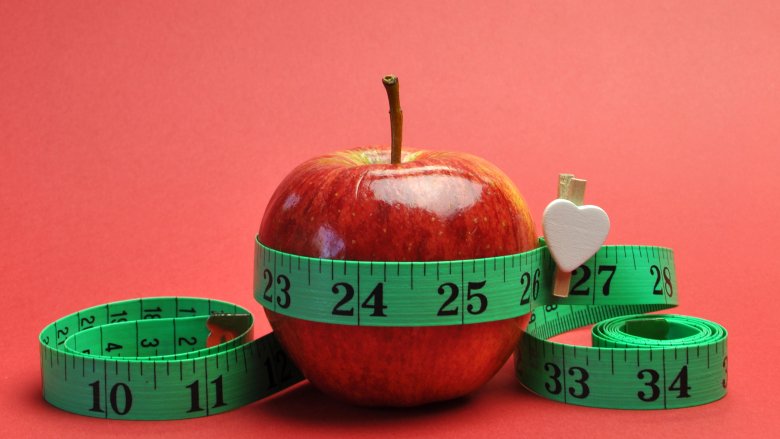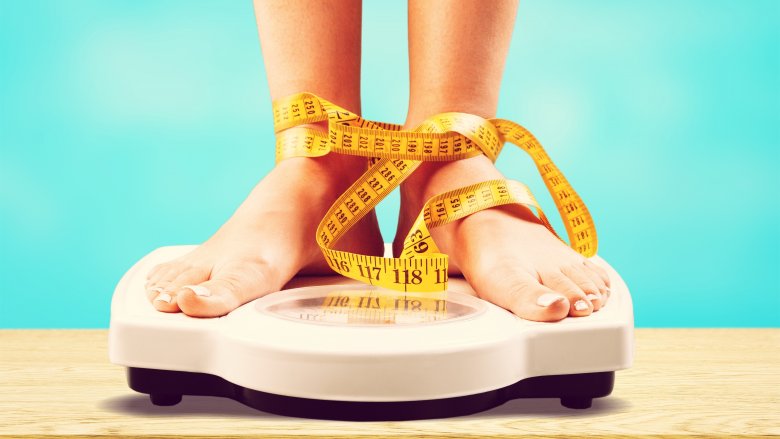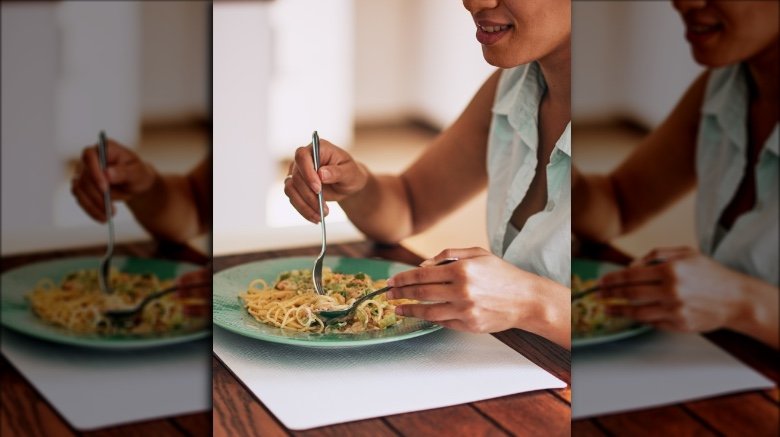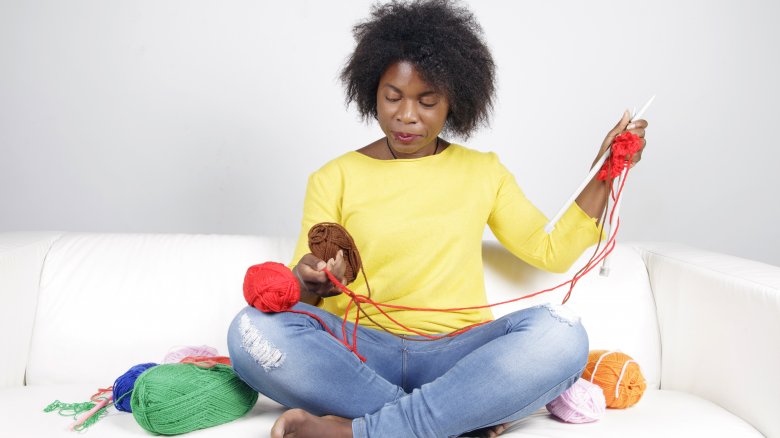Tips For Your New Year's Resolution To Lose Weight
By December, you may have already planned your New Year's resolutions in the hopes of assuring a good January and beyond. According to a survey conducted at the outset of 2018 by Varo Money, Inc., a mobile banking company, there are plenty of resolutions — big and small — to choose from. Nevertheless, a whopping 43 percent of the people surveyed shared a common resolution: to lose weight or get in shape.
If you're of that 43 percent, you may feel tempted to turn to dangerous fad diets, but Michelle May, physician and author of Eat What You Love, Love What You Eat, offered much better advice. "To make a sustainable change," she told U.S. News & World Report, "the things you are thinking about doing in the New Year need to be things you can do every day for the rest of your life." Here are some ways to do just that.
Quit dieting once and for all
If you've tried what feels like a million different diets in your lifetime, then deep down you already know the truth: diets don't work — and it has nothing to do with you. Diet plans — especially ones that call for extreme restrictions or special products — just aren't sustainable.
Diets are also directly responsible for weight gain over time — not loss. A comprehensive study of 4,000 twins between the ages of 16 and 25 proved that those who dieted were more likely to gain weight than their identical twin who did not. The study also revealed that women who try just one diet are three times as likely to be "overweight" and women who tried two or more diets were five times as likely. Another study found that young girls who diet regularly were 12 times more likely to binge-eat just two years later compared to their peers who did not diet. If you've been blaming yourself for not being able to lose weight on a diet, well, you know where to direct that blame instead.
Focus on health instead of weight loss
Even if you recognize the dangers of dieting, it can be hard to get behind the idea of giving it up — especially if you still want to lose weight. And you're not alone in wanting that. According to the Centers for Disease Control and Prevention's National Center for Health Statistics (via Time), over half of American women are in the same boat. So, what's a woman to do?
Everyone — whether they want to lose weight or not — can benefit from changing their focus. "People should not focus on weight, people should focus on health," Gary Wittert, an endocrinologist and professor at the University of Adelaide, revealed to the Australian Broadcasting Corporation. "If you switch the debate and say, 'stay the same weight if necessary, but there are four or five things you can do to improve your health' — then the pressure and distress [of dieting] is relieved." When people switch gears in this way, he revealed that some "do lose weight" while also preventing "further weight gain across the population."
Eat more real food
By 2013, processed food accounted for 70 percent of the American diet. In an interview with Marketplace, author of Pandora's Lunchbox Melanie Warner revealed that there some marketing execs of food corporations who do have a desire to create healthier food, but when "they try to take out things like sugar and salt, the products just kind of fall apart." She continued, saying, "And oftentimes, people don't buy them."
Some people have instead started recognizing the benefits of consuming real food, like fruits, vegetables, brown rice, and other single-ingredient, unprocessed foods. Unlike processed food, which increases your risk of cardiovascular disease diabetes — and yes, weight gain — real food is great for your health. It might even help you focus, sleep better, and improve your mood. Mara Weber, a clinical inpatient dietitian at The Ohio State University Wexner Medical Center, confirmed to Health that phasing out processed foods can also "help you lose weight."
Give yourself permission to eat the cookies
Although real food is undeniably great for your health, you should never beat yourself up for eating your favorite processed cookies and brownies. While some have chosen not to keep certain foods in their home for fear of eating them all in one sitting, Evelyn Tribole, a registered dietician and coauthor of Intuitive Eating, actually recommends buying the cookies or whatever food you would've viewed as off limits on a traditional diet. "When you rigidly limit the amount of food you are allowed to eat, it usually sets you up to crave larger quantities of that very food," she and Elyse Resch wrote in their book.
Additionally, when you think of a food as "extra special," you're likely to want to eat more of it. What happens when you actually allow yourself access to a formerly "forbidden" food? "Some people actually discover they don't like it as much as they thought they did," Tribole told Fitness Magazine.
Practice mindful eating
Heidi Schauster, a registered dietician and certified eating disorder registered dietician, revealed on her site that, while she recommends not making weight loss your primary goal, some people do "lose weight while they work on eating intuitively and mindfully."
Eating mindfully, according to the expert, involves slowing down and savoring each bite. "We aren't eating a certain amount of calories or carbs or points," she explained. "We are eating life-giving, pleasure-providing food — and we will eat just enough of it because we are staying present with the eating experience, paying enough attention to the food and our bodies as we eat it."
Instead of turning on the television or playing a game on your phone while you eat, try solely focusing on what you're eating. Barbara Meyer, the program director of Green Mountain at Fox Run, a non-dieting weight-loss retreat for women, recommends trying a meal in silence. "It's a profound eye-opener for many women, because they realize they don't listen to their bodies when they eat," she told Fitness Magazine.
Eat when you're hungry, stop when you're full
Although the "eat when you're hungry, stop when you're full" philosophy is not exactly new, it is something many have struggled to put into practice — especially the latter portion. In order to stop eating when you're full, registered dietitians Evelyn Tribole and Elyse Resch revealed in Intuitive Eating that you need to "feel your fullness."
By paying attention to the signals your body gives when you're starting to get full, you can determine when to stop. "But, remember," the dietitians advised, "the only way that you can do this is to give yourself unconditional permission to eat. You must firmly believe that you will be able to eat again when you get hungry in order to be able to stop when you're full." The experts also recommended taking breaks while eating to assess your level of fullness and even asking yourself if you actually like what you're eating or if you're just eating it because "it's there."
Build exercise into your everyday routine
Doctors and dietitians alike agree that exercise is vital – not only for weight loss, but for your overall health. When you think of exercises for weight loss, you might think of high-intensity cardio sessions or bootcamps. Medical doctor and professor at Pennington Biomedical Research Center in Louisiana said the best exercise for weight loss is actually — wait for it — "the exercise you'll do." Makes sense.
Registered dietician Sarah Minkow holds a similar opinion. "One of the best things we can do for our health is to get some form of physical activity every day," she wrote. "No need to kill yourself at the gym or by doing CrossFit." Minkow said exercise should not be regarded as something you do to "burn off" excess calories, but that it should be "enjoyable and part of your daily life" — even if that just means parking a little further from your office or opting for stairs instead of elevators.
Address your emotions
One study of over 1,500 people revealed that emotional eating was a far greater cause of weight gain than even lifestyle behaviors. If you are someone who emotionally eats, you can see how this is true. Surely, many people are stuck in a pattern of heading to the convenience store, grabbing themselves their favorite pint of ice cream, and "dealing" with their emotions one spoonful at a time. Of course, after eating all of that ice cream, no one is likely to feel any better than before they started.
When you feel the craving to emotionally eat, but are not hungry, registered dietitian and nutrition manager at Eating Recovery Center in Texas, Kathryn Johnson, told US News & World Report that you should ask yourself: "What am I feeling and what do I really need right now?" She explained that you may find that taking a short nap or meditating to be a better way to combat your stress.
Take up knitting
According to a study published by Knit for Peace (via HuffPost), there are some compelling reasons to start knitting. One case study, Sarah R., revealed, "[It] keeps hands busy, so I'm not snacking in the evenings when watching TV." She further stated that the hobby helped her give up smoking and feels it could help others conquer their addictions. And that's not all.
"There is an enormous amount of research showing that knitting has physical and mental health benefits, that it slows the onset of dementia, combats depression and distracts from chronic pain," the report revealed. Another study conducted by Harvard Medical School's Mind and Body Institute (also via HuffPost) found that knitting can even induce your body's relaxation response and lower heart rates by about 11 beats per minute. In addition to improving your health, knitting can also fulfill another popular New Year's resolution: learning a new skill or hobby.
Treating your body with care
Psychologist Renee Engeln, who is also the director of the Body and Media Lab at Northwestern University and author of Beauty Sick, told Shape that "taking care of your body" is part of the body-positivity movement. And that means that making changes is okay. But first, you must consider why you want to change your body. "Making choices for ourselves (including whether or not to lose weight) without the influence of problematic beauty ideals is possible, but requires a lot of introspective work," body activist Erin Brown explained.
Body-positive speaker and trainer Kelly Coffey also revealed that she gained more than 60 pounds after losing 160 pounds through gastric bypass. "Prioritizing weight loss didn't result in sustainable weight loss," she revealed. Later, she refocused her attention to make "the most caring choice" in all aspects of life. "Since I shifted my focus in that one critical way," she explained, "I've naturally arrived at a weight I feel comfortable with, developed a body I feel sexy and confident in, and maintained or improved on that for over 10 years." Now, doesn't that matter much more than a number on the scale?










